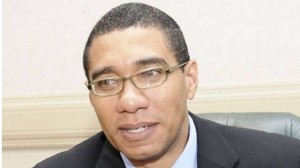 PRIME Minister Andrew Holness remains confident that Jamaica will achieve its target of five per cent growth in the next three years.
PRIME Minister Andrew Holness remains confident that Jamaica will achieve its target of five per cent growth in the next three years.
“People have said it is an overly ambitious target, but I am strongly of the view that we will achieve the growth targets set. We are also very cognisant of the significant challenges that the Jamaican economy faces, but these challenges are not unique, as these are features of Caribbean economies,” Holness said.
He was addressing the Sixth International Monetary Fund (IMF) High Level Caribbean Forum, held at the Jamaica Pegasus hotel in New Kingston yesterday.
The prime minister said some of the challenges include high public debt, vulnerability to natural disasters and external shocks, high energy cost/security, and migration of highly skilled workers.
“We have significant structural problems, as well, that impede growth, such as inefficient bureaucracies within our public sector that need real and deep reforms to make them more efficient and more responsive and effective in service delivery and in carrying out their regulatory and permitting duties,” he argued.
At the same time, the prime minister noted that Jamaica’s previous Extended Fund Facility and the current Precautionary Stand-by Arrangement with the IMF are yielding dividends.
“Not only has Jamaica met all structural benchmarks through to the end of September 2017, but the focus on fiscal discipline, business process efficiency and managing our monetary programme is producing positive impacts [on the economy],” he noted.
He highlighted that inflation has continued to remain low and that non-borrowed net international reserves now stand at US$1.8 billion at the end of June.
Holness added that Jamaica continues to access local and international capital markets at competitive rates, while the Central Bank continues to lower policy rates.
“What I am particularly proud of is that unemployment is declining. According to the latest quarterly economic performance review from the Planning Institute of Jamaica, the unemployment rate as at July 2017 was 11.3 per cent, representing the lowest quarterly rate recorded since July 2009,” the prime minister pointed out.
Holness said he is particularly encouraged that youth unemployment has declined by 2.1 percentage points to 27.5 per cent.
“So, we are making significant progress in reducing our debt, increasing our economic stability, and taking on a posture for growth,” Holness said.
The conference is being jointly hosted by the Government of Jamaica under the theme ‘Unleashing Growth and Strengthening Resilience in the Caribbean’.
Among the key topics for discussion at the conference include ‘The Caribbean Growth Challenge: Crime and Youth Unemployment’, ‘Fiscal Policy and Political Cycles’, ‘Financial Sector: Stability and Growth Trade-offs’, and ‘Challenges and Opportunities in the Caribbean’.
Today, IMF Managing Director Christine Lagarde is expected to hold bilateral talks with the prime minister and meet with Leader of the Opposition Dr Peter Phillips, and women leaders.
She is also expected to visit the Mona campus of the University of the West Indies where she will participate in a book launch and hold an interactive session with students.
